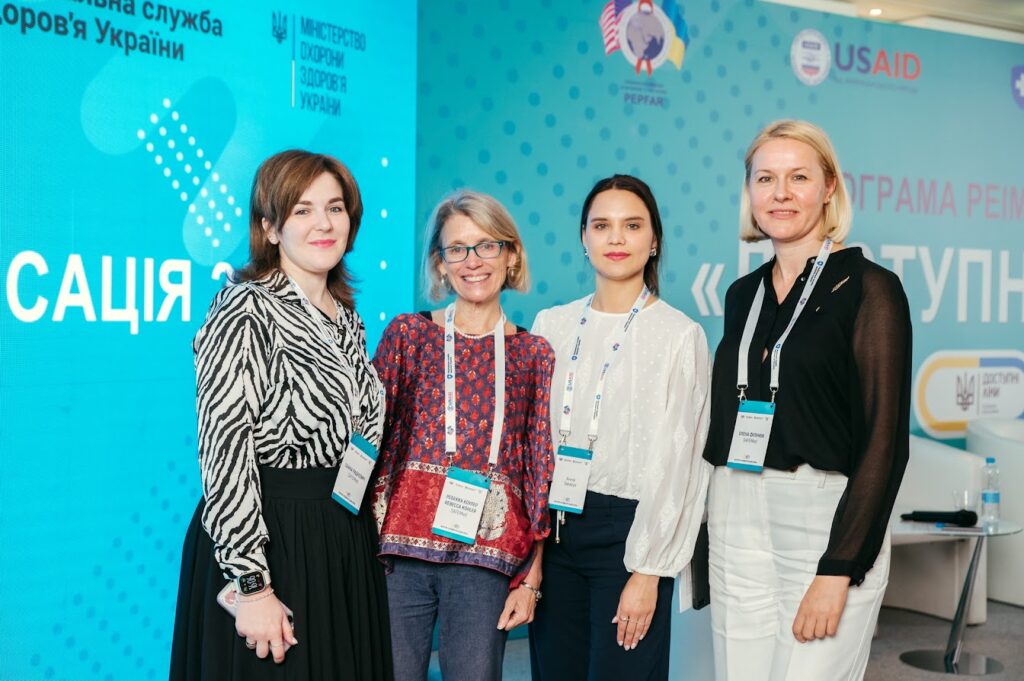Reimbursement 2024 Forum: Celebrating Milestones and Forging a Sustainable Future for Ukraine’s Health System
Reimbursement 2024 Forum: Celebrating Milestones and Forging a Sustainable Future for Ukraine’s Health System
By Olha Oberdiienko and Sarah Hladik

Providing equitable access to health care treatment comes with many challenges. How do we ensure medicines are safely stored and distributed? How do we reach patients in remote and rural areas? How do we track medicine supply and prevent stockouts? These questions become even more complicated to solve when working under the conditions of a full-scale war. But through its Affordable Medicines Program (AMP), the Government of Ukraine has helped bring quality care within reach for more patients. Five million Ukrainians have now been able to receive the necessary medications they need either free of charge or with a partial payment through the program. Since 2019, participating pharmacies have been reimbursed more than 12.6 billion UAH (310 million USD) for dispensed medicines, which, in turn, has helped significantly reduce patients’ out-of-pocket expenses.

These milestones were highlighted at the “REIMBURSEMENT 2024” forum that took place in Kyiv on September 18, hosted by the National Health Service of Ukraine (NHSU) with support from the MSH-led USAID Safe, Affordable, and Effective Medicines for Ukrainians (SAFEMed) Activity. This year’s forum was centered around sustainable development of the reimbursement program and its accessibility for patients. Despite the difficult conditions of the war, the NHSU, with support from SAFEMed, has expanded the list of medicines covered under the program and helped more patients benefit from these services.
The implementation of electronic prescriptions has been a game-changing tool for increasing cooperation and transparency with participating pharmacies. E-prescription enables the quick exchange of information between medical institutions and pharmacies, allowing the NHSU to directly transfer funds to pharmacies for dispensed medicines. During the panel discussion, SAFEMed Chief of Party Rebecca Kohler explained how the introduction of the e-prescription tool in 2019 helped make the reimbursement program more efficient and discussed how SAFEMed has been working to innovate the program. “E-prescriptions have greatly strengthened the Affordable Medicines Program. For years, we have been improving electronic tools, working with IT teams, expanding functionality, and trying to prevent fraud through the program,” said Kohler. “The fact that not only the medicines included in the program but also other medicines can now be prescribed through e-prescriptions confirms the effectiveness and usefulness of this tool.”

The number of pharmacies participating in the AMP is growing each year, with the majority being private pharmacies. With SAFEMed’s support, the NHSU continues to foster these public-private partnerships, which are crucial to increasing transparency and government oversight as well as boosting economic engagement for the state.
The AMP has also broadened access to life-saving medications for patients in hard-to-reach areas. In February 2024, the NHSU partnered with Ukrposhta, Ukraine’s national postal operator, to deliver medicines covered by the program to settlements where there are no pharmacies. Through this collaboration, patients have already submitted and received nearly 2,800 e-prescriptions and the program has been able to expand access to medications for residents in frontline regions, including Kharkiv, Sumy, Donetsk, Kherson, Mykolaiv, and Zaporizhzhia oblasts.
SAFEMed also helped the Ministry of Health coordinate and expand the use of mobile pharmacies to help reach patients in remote and war-affected areas, as well as set up pharmacy contracting practices, a medicine reimbursement policy, and a communications campaign for patients. Through close collaboration with private pharmacies, government agencies, and international partners, the AMP is making life-saving medicines more accessible to those that need them most, and in turn helping to build a more resilient health system in Ukraine.
